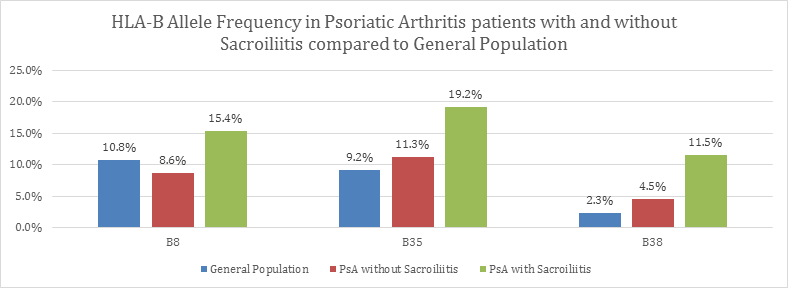Session Information
Date: Monday, October 22, 2018
Title: Spondyloarthritis Including Psoriatic Arthritis – Clinical Poster II: Clinical/Epidemiology Studies
Session Type: ACR Poster Session B
Session Time: 9:00AM-11:00AM
Background/Purpose:
Psoriatic arthritis (PsA) is a heterogeneous disease with strong genetic heritability. Class I major histocompatibility complex (MHC) genes have been associated with PsA phenotype (1), though data is limited. The goal of this study was to establish the frequency of human leukocyte antigen (HLA)-B alleles in patients with PsA at our center and evaluate associations of allele frequency with radiographic sacroiliitis and other clinical features of PsA.
Methods:
This was a retrospective observational study of patients with PsA at a tertiary academic medical center where patients were identified by ICD code and confirmed to have PsA by an experienced treating rheumatologist. Patients with HLA-B locus testing by reverse sequence specific oligonucleotide (SSO) hybridization were included in the study. Background demographics including age, sex, and ethnicity as well as available radiographs of the sacroiliac joints and MRI exams of the pelvis were collected. Clinical features of psoriatic skin disease, dactylitis, enthesitis, uveitis, and nail disease were also noted. Frequencies of HLA-B alleles were calculated for PsA patients with and without sacroiliitis, then compared to estimates from the general population based on ethnic mix (2). Associations between HLA-B alleles and sacroiliitis on imaging were evaluated with Fisher’s exact test
Results:
We identified 234 patients using ICD coding for psoriatic arthritis from outpatient visits with the treating rheumatologist. Of those, 89 patients did not have HLA-B locus testing and were excluded. 146 PsA patients were included in the study with mean age 48.6 ± 13.5 years, 56.8% female, 76.7% Caucasian, 8.2% Asian, 7.5% Hispanic, and 1.4% African American. The most common HLA-B alleles amongst PsA patients were HLA-B*35, B*44, B*8, B*7, B*27, and B*38 (Figure 1). X-rays of the sacroiliac joints were available in 86 patients, with 11 cases of radiographic sacroiliitis (12.8%). MRI of the pelvis was available in 25 patients, with 8 cases of sacroiliitis found (six previously noted on x-ray, and two pre-radiographic). Among patients with imaging-proven sacroiliitis, HLA-B*35, B*8, and B*38 were the most common alleles and significantly associated with sacroiliitis (p = 0.03).
Conclusion:
In patients with psoriatic arthritis, HLA-B alleles B*35, B*8, and B*38 may be associated with sacroiliitis. Further larger studies would be helpful in determining the role of HLA-B gene subtypes as predictors of disease features in psoriatic arthritis.
Reference:
1. Haroon M, et al. Ann Rheum Dis 2016;75:155-162
2. Maiers M, et al. Hum Immunol 2007;68(9):779-88
Figure 1
Figure 2
To cite this abstract in AMA style:
Kuo D, Valera I, Taylor M, Altman R, Ranganath VK, Aung T, Louie J, Kafaja S. Association of HLA-B Type and Sacroiliitis in Patients with Psoriatic Arthritis [abstract]. Arthritis Rheumatol. 2018; 70 (suppl 9). https://acrabstracts.org/abstract/association-of-hla-b-type-and-sacroiliitis-in-patients-with-psoriatic-arthritis/. Accessed .« Back to 2018 ACR/ARHP Annual Meeting
ACR Meeting Abstracts - https://acrabstracts.org/abstract/association-of-hla-b-type-and-sacroiliitis-in-patients-with-psoriatic-arthritis/


